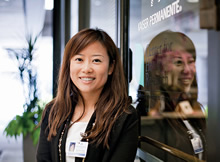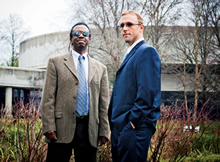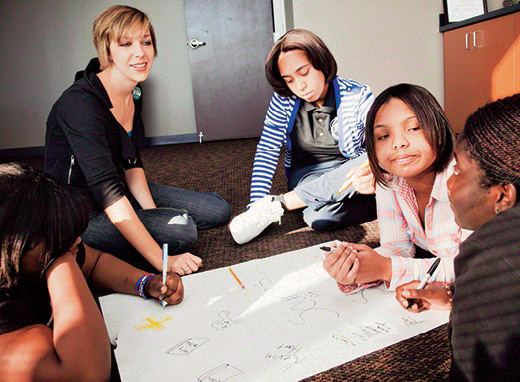Every day, students and alumni of Emory's Rollins School of Public Health (RSPH) are building public health capacity in Atlanta and across Georgia.
CDC, Emory's next-door neighbor, employs more than 400 alumni, many of whom give generously of their time to mentor students. Less than five miles from Emory are other major partners — CARE USA, the American Cancer Society, the Arthritis Foundation, the Carter Center, the Task Force for Global Health, the Georgia Department of Public Health, and local health departments — where students and alumni work together in this public health capital of Atlanta.
Emory students' engagement in the public workforce keeps growing. A few samples:
Grooming teen ambassadors for health
Julie Straw, who graduated this year with a master's of pubic health, has sought to reduce health disparities for most of her life. During her formative years in Michigan, she went on mission trips to Bolivia and Uganda and worked with inner-city youth in Detroit. In college, she taught HIV modules to orphaned teens in South Africa.
At Rollins, her interests spawned the Community Health Ambassador (CHA) program to train local teens as peer health educators. Straw partnered with the Good Samaritan Health Center in west Atlanta to create the program under the auspices of the Emory Public Health Training Center. Established in 2010, the center is a learning community that builds competence in the domestic public health workforce, in part by enabling students to work in underserved areas. Straw was the first RSPH student awarded a summer field placement in Georgia by the center. Drawn to Good Samaritan at a Rollins career fair, she developed the CHA program to fill a need for encouraging healthy relationships among teens.
Straw worked with community members to organize the CHA program and cover topics identified by teens and their parents: dating violence, healthy eating, HIV prevention and stigma, safe sex, mental illness and suicide, substance abuse, and peer and gang violence. Students graduated from the program after eight weeks.
"Julie took on an incredibly complex task of developing and executing a mentorship program," says William Warren 79M, president and founder of Good Samaritan. "The teens who participated truly seemed to enjoy their experience. If they enjoy it, then they likely will remember what they were taught and carry these lessons through life."
Building health capital locally
 | |
| Master's of Public Health student Momoko Kitami |
For the past few years, residents living in Atlanta's historic Fourth Ward district have seen quite a bit of change in their neighborhood thanks to the Atlanta BeltLine, a redevelopment initiative to create more green space and connect neighborhoods along a former railroad corridor.
Kate Huber, who graduated with a master's of public health this year, spent time at a new skate park talking with residents to gather information for a survey conducted by the Georgia Tech Center for Quality Growth and Kaiser Permanente. Huber's questions to residents focused on social capital—how people in communities help each other.
The Atlanta BeltLine survey is one of several projects led by Michele Marcus, professor of epidemiology, at the Kaiser Permanente Center for Health Research.
Momoko Kitami, a Woodruff Scholar and physician from Japan set to graduate in 2013 with a master's of public health, also is working with Marcus and Atlanta obstetrician Annette Miles on a study looking at pregnancy complications and outcomes for women over 40. The research will provide valuable data to better inform these women about potential risks.
"Dr. Marcus is helping me learn how to form research questions, analyze data, and consider all of the details and processes that go into research," says Kitami, who was paired with her mentor through Rollins' Scholars in Action program. "Dr. Miles has come to see certain patterns among her patients, but it's hard for her to take the time to conduct the research. We're helping her answer those questions."
Moving Mountains to Prevent Disease
 | |
| Moses Katabarwa (left) and Adam Weiss are health leaders at the Carter Center, one of Rollins' public health partners in the Atlanta community. |
Adam Weiss, a candidate for a career master's of public health in 2013, brings a wealth of field experience to his first-year class at Rollins because of his full-time job: assistant director of Guinea worm eradication programs at the Carter Center.
Weiss first learned of the disease in 2003 as a Peace Corps volunteer in rural Ghana. By his second year, he'd become the Peace Corps' Guinea worm coordinator for the nation. When his Peace Corps service ended, he remained in Ghana five more years as a Carter Center consultant, helping design and implement interventions that resulted in disease eradication. After serving for a year in Ethiopia—and likely witnessing the last case there as well—Weiss returned stateside to pursue his mph and join the Carter Center team in Atlanta. Like dozens of Rollins students before him, he is learning from leading experts in health, human rights, and conflict resolution.
One of those colleagues is medical epidemiologist Moses Katabarwa, a 1997 graduate who joined the Carter Center in his native Uganda to map the prevalence of river blindness, the second leading infectious cause of blindness worldwide. He also directed a WHO/TDR-sponsored program to control the disease using a community-based "kinship model" of health delivery that he tailored to fit his nation's context.
That program's success—more than 90 percent of communities achieved treatment coverage of 90 percent or greater annually—led to a senior post in Atlanta with the Carter Center's programs in river blindness, lymphatic filariasis, and schistosomiasis.
Although they work on different diseases, Katabarwa has much to teach a young colleague.
"Adam and I often chat away about dealing with government ministries and how to, let's say, get a car imported into the country," he says. "Most people don't think of these things as public health. But it can be very challenging. And you can't succeed in public health unless you know who can move mountains."

